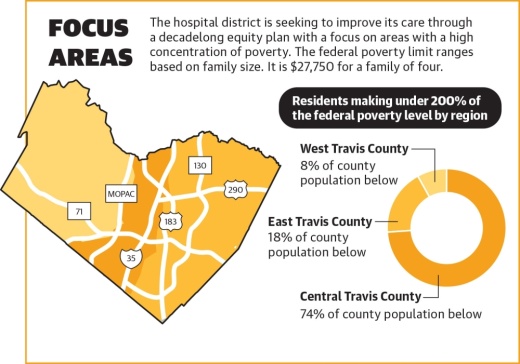The voter-approved county health care district was established in 2004 to provide medical care for uninsured and low-income residents. In fiscal year 2020-21, Central Health served more than 147,000 patients. County taxpayers are footing a $506.88 million bill for the entity in FY 2021-22.
In February, the district unveiled Central Health’s Equity-focused Service Delivery Strategic Plan, aimed at improving and expanding services, President and CEO Mike Geeslin said. The plan is expected to take up to 10 years to complete and includes the addition of new clinics in eastern Travis County, which began this spring.
“We still have a long way to go,” said Monica Crowley, Central Health’s vice president and chief planning and strategy officer, at an April Travis County meeting, pointing toward the increasing population and growing need for health care access.
Central Health is also fielding claims and legal action over its scope of work, spending, and the accessibility to services from The University of Texas at Austin Dell Medical School for low-income residents.
A March report from local NAACP and League of United Latin American Citizens chapters outlined multiple “red flags” of possible improper spending, planning, dealmaking and insufficient care affecting minority residents that already prompted some response from county leaders.
“I’m certainly confused about the ability of our indigent, medically needy community to access care at Dell Medical,” Commissioner Brigid Shea said.
Shea said that question is likely driving the criticism and lawsuit filed against Central Health.
While county leaders signed off on the district’s nearly 39% budget increase last year, they also said they hope to review more information on Central Health operations as the equity plan and related access initiatives come to fruition. A thorough audit of the health care organization will also come through a formal performance review that could begin next year, and which county commissioners expect to detail this summer.





